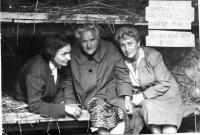Live and forget

Download image
Marie Traplová, nee Šturmová, was born in the village of Lipí in the České Budějovice region on August 4th, 1920. She also spent her childhood there. She worked in the fields with her siblings and her parents. She got trained as a dressmaker. She came across the illegal Communist resistance group of Karel Lavička at the beginning of World War II. Their main purpose was to help the arrested and their families. The volunteers were usually hunted for food in local villages. Karel Lavička was put to death during the proclamation of the first martial law. However, the resistance activities carried on until 1943 when the Gestapo arrested the rest of the group. Marie Traplová experienced the interrogations in Budějovice and the camps in Terezín, Auschwitz and New Brandenburg. After the war, she married a man who was a commander of the bodyguards of Rudolf Slánský. She was also arrested during the trials and purges connected with Slánský, but she was released soon after. Marie Traplová has stuck to the Communist beliefs.
